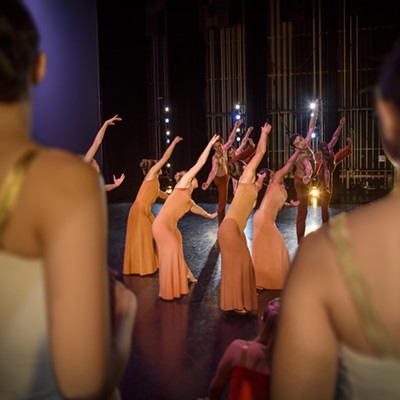"I'm sorry ... I'm sorry ... I'm sorry . . ."
The litany of "I'm sorry's" are pervasive, sprinkled around with regularity by a whole lot of characters. The play, "This," by Melissa James Gibson, garnered great gasps of delight from reviewers when it opened in New York. But the production I saw, although it had its moments, left me unsettled by its disjointedness and the lack of depth of its characters.
It is a comedy of the "dramedy" sort, in which there are plenty of laughs which rise appropriately enough from what is really a rather serious story
Tom (Zachry Colston) and Marrell (Rhetta Kampel), in their late 30s, have just had a child who seems to only be able to sleep in 15-minute segments. Jane (Heather Marie Cox) is their friend, a poet whose husband died much too young within the last year. Alan (Micah Bond) is a close chum, gay and self-deprecatingly witty. They all went to school together, except Tom, who worked as a groundskeeper of the school. In the first minutes of the play, they have gathered to introduce Jane to Jean Pierre (Aaron Arseneault), a French Doctors Without Borders member who is in town for a convention. They play a game, although Jane hates games, in which Jane leaves the room while the others, in theory, make up a story which she will, with a 20-questions-like effort, try to discern. But there is no story, just a guideline for the so-called storytellers, which calls for answering "no" or "yes" depending on whether the question ends in a consonant or vowel.
It's a little harsh, though quite tempting, to say that Ms. Gibson has used similarly arbitrary rules for her storytelling. There are just so many things that don't seem plausible. It's really Jane's story, told within the context and the actions of the whole group, and Gibson intends for her to undergo a serious transformation. But here it is so subtle that it hardly seems believable. Since the moment it becomes clear that she might be on her way signals the final moment of the play, we should know we have come to the conclusion. But we don't. There is an awkward silence while the audience tries to decide that the show is over.
There are some bright spots. Kampel as Marrell, who is a bar/club singer, as well as new mother, has found some credible roots for her character. And, she sings quite well. Bond does a good job as Alan, but the character seems a little too much the stock gay-friend-who-can be-relied-on-to-liven-things-up-and-perhaps-provide-a-bit-of-thought-provoking-in-the-process character we've seen repeatedly in numerous stories.
I think part of the problem I have embracing this play is that, really, all of these characters are sad, troubled deeply, each in his own way. But our call to sympathy gets buried in the comic aspects of their situation. Finding a balance creates hard work for even the most skilled actors, and it is certainly a challenge for young ones. But you know what? That's what those students are there for. To be challenged and to experiment and to learn. And these actors' efforts and investment in this show is obvious. And appreciated. There are some genuinely earned laughs. The designers, also students, have done some excellent work. But all too often the show seems as lost as its characters.
Marc David Pinate is the new producing director of Borderlands Theater, assuming the role when long-time leader Barclay Goldsmith recently stepped down. He is youthful but well-seasoned and he has some exciting ideas for extending Borderlands' outreach into our diverse community.
For its current offering, "Absence/El Ausente," long-time Borderlands' associate Eva Tesslar directs the play by Victor Hugo Rascon Banda, a celebrated contemporary Mexican playwright who died in 2008. Tesslar translated and directed a very good production of "Deseo/Desire" by Rascón Banda several years ago here.
"Absence/El Ausente" relates the story of a family in Mexico City. Pablo (Luke Salcido), who is married to Rosa (Anel Schmidt), has decided to emigrate to the U.S. because of his long-time lack of work. He leaves his wife and children with his parents, Blas (Roberto Garcia) and Raquel (Rosanne Couston), aging and doing their best to accommodate Rosa's absence in the household as she works long hours. They are puzzled by the growing distance between them and the children, especially when they learn that the children have been hiding notifications from the school that they are in serious trouble, having both academic and behavioral issues.
The play shines a disconcerting light on the deterioration of those individuals and the vital institutions they represent when economic desperation drives a wage-earner to become a job-seeker in what can be a dangerous and hostile foreign world. It's an issue which is often left in the shadows when immigration issues are discussed. This illumination is the value of this play, and Rascón Banda tells his story with both an austere and ethereal economy.
Borderlands' production does allow that disturbing light to penetrate, although there are also aspects that cast their own shadows, preventing a greater effectiveness. The acting is uneven and the action feels a bit static, with not quite enough tightening of the tension we should feel. Rascón Banda creates his tale with a creeping sense of doom, and since we are delivered to a very painful conclusion, we should feel that undercurrent from the get-go, growing steadily to ready us for a very disturbing ending.
Even so, we are pained by the journey of these characters. There's a lot to think about here, and to feel, and although we may not be led to be as emotionally invested as we might be, we do get the awesome tragedy that has unraveled.
This production will be performed totally in Spanish at the Center for Global Justice the last weekend of its run. This is a first for Borderlands and signals an exciting commitment to widen their audience for their special brand of theater.








